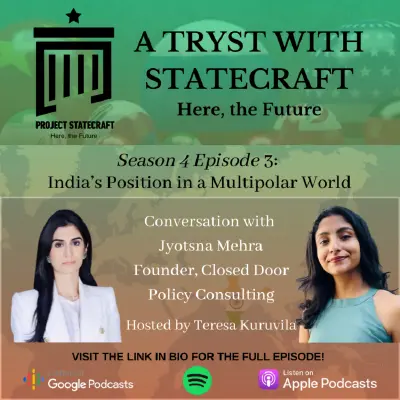In this episode, we are joined by Ms. Jyotsna Mehra to discuss India's evolving role in a multipolar world. Ms. Mehra is a highly accomplished Foreign Policy professional and founder of Closed Door Policy Consulting. With her extensive experience in research, analysis, advocacy, and strategic communication, she has contributed significantly to shaping foreign policy through her consulting work with India's Ministry of External Affairs and Australia's Department of Foreign Affairs and Trade. She holds a degree in Modern South Asian Studies from the University of Oxford, focusing on international relations, and a bachelor's degree in Politics and International Relations from the University of Manchester. Her contributions extend globally through her association with leading think tanks across the UK, US, and India, and as the 2021 South Asian Voices Visiting Fellow at the Stimson Center in Washington, DC.
The episode explores India's evolving role in a multipolar world, shedding light on how the country has refined its foreign policy to adapt to changing global dynamics. Jyotsna delves into multi-alignment and strategic autonomy, often conflated in discussions, and examines how India has navigated these principles throughout its history.
From its early years as a newly independent nation, economically fragile and situated in a world divided by two dominant superpowers, India adopted a stance of ideological distancing. Over the last decade, India has leveraged partnerships and collaborations with the national interest at its core, advancing the ideas of multi-alignment and strategic autonomy. The country has also worked on diversifying its dependencies and reducing them by fostering Indigenous development in key areas such as energy and defense.
India’s Act East and Neighbourhood First policies have not only enhanced its standing in the domestic politics of neighboring countries but also strengthened its influence in the broader global order. These policies have helped India cultivate goodwill and reinforce its position as a key player in regional and international politics.
The episode concludes with Jyotsna emphasizing the crucial role of hard power in shaping India’s future in global politics. She argues that while military and economic strength will be the primary drivers of India’s influence on the world stage, soft power—through cultural diplomacy, international goodwill, and strategic partnerships—can effectively complement this. However, she strongly believes that hard power will be the decisive factor in securing India's place in a competitive and increasingly multipolar world.
Don't miss out on this episode which offers a nuanced perspective on India’s foreign policy evolution, providing an in-depth look at the nation's strategy for navigating global complexities while reinforcing its position as a major player in international relations.
